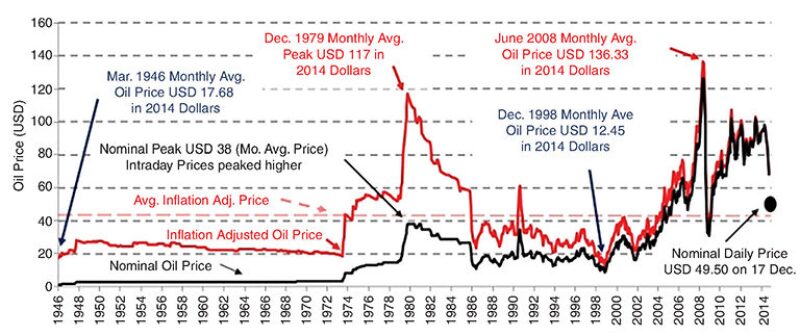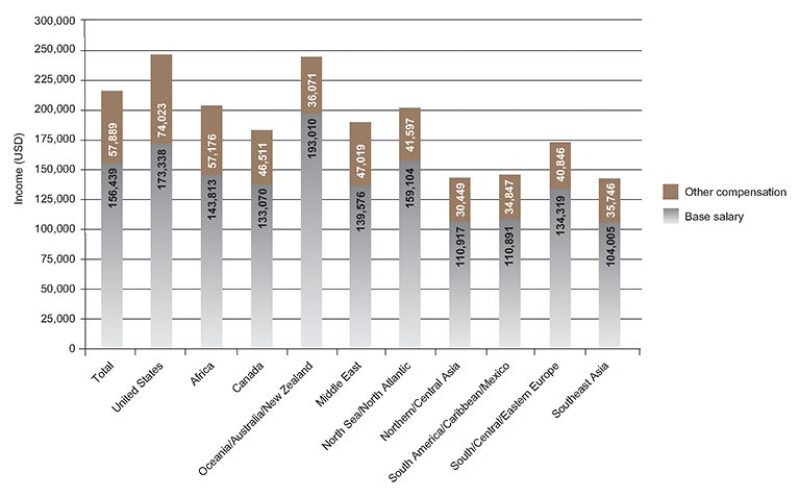Never mistake a lack of volatility for stability. Due to many influencing factors, the oil and gas industry has experienced several cycles of meteoric rises and plunges in oil price. With the volatility of oil prices comes key business decisions in the industry, which may or may not directly affect the career of young professionals (YPs).
Fig. 1 shows the monthly crude oil prices from 1946 to November 2014, adjusted for inflation. Following significant oil price peaks, for example, in 1979 and 2008, were the declines.

Below are some of the historically consistent reactions during downturns in oil prices:
- An increased drive to develop alternative (and cheaper) sources of energy
- Increased employment in industries other than the oil and gas industry*
- Enrollment in petroleum engineering education decreased, but after staying steady for a few more years near the peak*
- Job cuts in organizations directly or indirectly related to the oil and gas industry
- Job restructuring, such as giving international staff new roles in their home countries, within the oil and gas industry
Knowing that oil price is cyclic in nature and very volatile, how can one apply the past lessons today?
Be a High Performer
It is true that at USD 30/bbl no job is indispensable. Nonetheless, being a high performer improves your chances of surviving the volatile times while actively advancing your career. High performers are characterized by their ability to deliver consistent and excellent results with a reputation for being competent and trustworthy. They master technical challenges, continually refine their leadership skills, and act as role models with a positive attitude that enthuses the company culture.
Being a high performer requires making personal sacrifices to ensure that even perfection is not good enough in the quest to succeed. You can build upon an attitude of relentless learning by transforming ideas into actions and tackling opportunities and challenges head-on. It is important not to lose the world around you and to keep your “radar” engaged for assessing opportunities and risks. This will help you to quickly manage pitfalls and ensure you are in the right place at the right time.
Getting on the coveted high-performer list may entail burdening stress, sacrificing your personal life, and may create friction between you and your colleagues. Hence, it is important to determine why you want to be a high performer, and not just how, in order to succeed in the long run. The Greek legend of Icarus illustrates the fine balance required when flying close to the sun, as the fall from grace can be often dramatic and harsh.
Reach Out to Mentors, Draw From Their Experience
The cyclical nature of oil prices is a recurring reminder to all working in the industry, particularly to those in contract or service-oriented postions, that the risk of losing job security is high. However, there is no disputing that the reward is also high as the 2014 SPE Membership Salary Survey Highlight Report clearly demonstrates (Fig. 2).

Keeping the fear of losing the job at bay is difficult but has significant long-term benefits. Think of the engineers who have endured the volatile cycles of the industry in their more than 30-year career. Take them out for a lunch or coffee, and ask them key questions that concern you. With the big crew change happening, do not forget to collect their post-retirement contact information to stay in touch.
Even though the senior engineers may have moved on to other opportunities or taken early retirement, understand that this is your opportunity to step up into the gaps and shine.
Downturns are often the best time to gain the most useful experience in a short period of time. Shadowing a mentor who thinks on his or her feet and delivers on key business decisions will teach you great skills that remain relevant regardless of the oil price.
Don’t Be Shy To Showcase Your Skills
Like a lighthouse, your ability to weather the storm of a downturn in commodity prices is directly related to how strong of a foundation you have built in the off season.
As young petrotechnical professionals, we are often modest and let the facts speak for us. However, in order to weather the downturn in oil price, your work must stay relevant and comprehensible. You are responsible for advocating a seat at the table. The expression “If you are not at the table, you are on the menu” holds true. After years of networking, do not be afraid to use your networks now, and equally so, do not hesitate to help another YP if asked.
Although it is tempting to exclusively focus on comparing yourself with peers during a retrenchment period, do not let your career drift. Do not strive to be better than anyone. Rather strive to be the best version of yourself and remember that the grass is greener where you water it. So proactively plan your career trajectory and achieve résumé-building tasks. Ensuring your résumé is up to date should not make you feel like a traitor. It is important to keep a career plan and continuous professional development log before you forget your measurable impact on your company.
What To Do if Your Role Becomes Redundant
Sometimes, even after you have done your best, a redundancy comes up. It may not be because of your own performance, but just an unlucky blanket management decision. If you happen to lose your job, do not lose your nerve. Though this is easier said than done, take solace in knowing that all commodities are cyclical in nature as supply and demand cycle continuously in an attempt to find equilibrium. History shows the oil and gas industry will continue to thrive and evolve, and so will the many jobs that are required to support it.
There are two main pitfalls to avoid. The first: Try not to take the easiest way out. Many people do just that. They start looking for a quick fix. By accepting the first job that comes along, they are simply postponing their problems. They risk getting stuck in a job they know in advance that they may detest. Today’s quick-fix solution becomes tomorrow’s enduring nightmare.
For you, it may be better to explore options such as furthering your education, freelancing, consulting, or even a part-time or temporary job, especially if you want to stay in the industry. The key is to maintain employability and this direction could help update and round up your skill sets.
The second pitfall is more psychological. When people do not have an income, they start looking down upon themselves. Debts may weigh heavily on their mind and prompt them to make suboptimal financial decisions. Try to have an emergency fund to fall back on in case of a job layoff. If you decide on pursuing a career outside the petroleum industry, think creatively about your strengths and how to apply them to other work environments. This would be necessary to keep you directed toward finding something you will enjoy doing.
Volunteering During a Downturn Has Career Benefits
Low oil price can put a remarkable strain on volunteers’ enthusiasm. This should be expected when your job is on the line, and volunteering does not put immediate food on the table in quite the same way as a paycheck. However, volunteering does provide clear benefits: It enhances your industry network, develops leadership skills, provides a résumé boost, and gives you access to technical information.
SPE is a great organization in which to begin volunteering, with opportunities on local section committees, conferences, outreach programs, and more. You never know how the next person you meet could positively impact your career.
________________
*Gupta, S. Oil Price—The Other Side of the Fulcrum. LinkedIn Pulse. https://www.linkedin.com/pulse/oil-price-other-side-fulcrum-siddhartha-gupta?trk=prof-post (accessed 15 April 2015).

